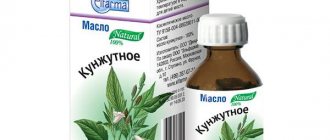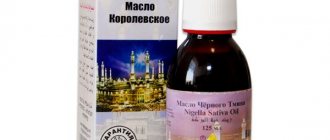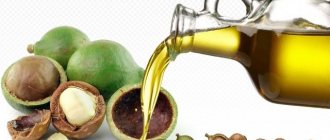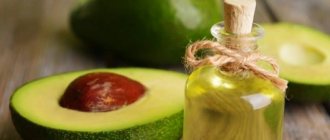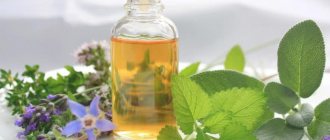What is apricot oil
Apricot oil is a product obtained from the seeds of the fruit of the same name. The emulsion is produced using the cold pressing method, due to which all the beneficial properties of the initial raw materials are preserved in the product. The oil is basic, which means it can be used even in its pure form. The product has a light yellow tint and a pleasant aroma.
It is recommended to store apricot oil in a dark glass bottle
The product should be stored in a dark glass bottle. The room should be cool. It is highly not recommended to store the product for longer than a year.
Interestingly, Chinese doctors have long used apricot oil as an anti-inflammatory agent. Through its use for medicinal purposes, the product has been found to give the skin a radiant and healthy appearance.
Compound
Apricot oil contains the following main components:
- Vitamin A. Has an anti-inflammatory effect, which is especially important for problem skin.
- Vitamin C. Helps maintain the elasticity and youth of the epidermis. Restores the skin's natural protective barrier.
- B vitamins. Nourish and intensively smooth the skin. Effectively eliminates the first wrinkles and makes deep ones less noticeable. In addition, B vitamins protect the epidermis from aggressive environmental influences.
- Vitamin F. Helps accelerate tissue regeneration, slows down the process of aging and fading of the skin, normalizes the activity of the sebaceous glands, prevents the enlargement of pores and the appearance of acne.
- Organic acids. Lenoleic, palmitic and stearic acids are involved in skin rejuvenation processes.
- Vitamin E. Has powerful antioxidant properties and also helps to enhance the production of elastin, which is responsible for the smoothness of the skin.
- Potassium. If there is enough of this element in the skin cells, the epidermis looks moisturized, and fine wrinkles are eliminated.
- Magnesium. It has a good effect on vascular health, restores blood circulation and enhances cell nutrition.
How to choose a quality product
When choosing apricot oil, pay attention to the following criteria:
- The natural product has a subtle nutty aroma. The latter may resemble the smell of almonds. An excessively strong aroma is a clear sign of counterfeit oil.
Real apricot oil has a light yellow tint.
- The consistency of the oil is liquid and slightly viscous. The product is quickly absorbed into the skin. If there is no way to test the product in the store, be sure to do it at home. You should not use a fake.
- Pay attention to the presence of a quality certificate from the manufacturer. You have the right to ask the seller for this document.
How is it produced?
Today, in our latitudes, apricot is a very common plant with which everyone is very familiar.
Its golden-orange ripe fruits are tasty and rich in vitamins. After drying them, dried apricots and apricots are obtained, which have valuable medicinal properties. And apricot juice can kill most pathogenic bacteria and slow down putrefactive processes. But fluid and aromatic oil is produced not from the pulp, but from apricot kernels. They are peeled from the hard shell, crushed and pressed. The product obtained by cold pressing completely retains all the beneficial substances and healing properties. At the same time, its price is affordable, since the production process is simple.
Benefits of apricot oil for facial skin
Apricot emulsion is ideal for skin suffering from a lack of vitamins and moisture. The product has the following properties beneficial to the epidermis:
- Nourishes, softens and moisturizes the skin, making it an excellent preventative against dryness and flaking of the epidermis.
- Accelerates the exfoliation of dead cells, due to which the skin renews itself faster.
- Helps stimulate the synthesis of collagen and elastin. These substances are proteins responsible for the tightness and smoothness of the epidermis.
- Rejuvenates the skin and smoothes out fine wrinkles.
- Helps tonify the epidermis.
- Evens out complexion.
- Eliminates inflammatory processes on the skin. This property is most in demand for problematic and sensitive epidermis.
- Normalizes the functioning of the sebaceous glands. In the case of dry skin, oil increases the productivity of the latter. If the epidermis is oily, the product helps eliminate excess sebum from the surface of the epidermis.
Rules for using essential oils
- You should not add essential oil to creams or other cosmetics - as many do, wanting to enhance the effect of store-bought cosmetics with something natural. The fact is that it is impossible to predict what chemical reaction will occur when essential oil is combined with the ingredients of the cream - such experiments can be harmful!
- The essential oil should be used with a base plant oil (such as almond, jojoba, wheat germ or grape seed oil).
- Nourishing vegetable oils , which are often used to care for dry skin (olive, peach and apricot), should not be used for acne oils, as they clog pores, which in the case of problem skin further aggravates the situation.
- 5-7 drops of essential oil in the base oil - no more! It is advisable to store the mixture in the refrigerator and wipe the affected areas several times a day.
IMPORTANT: Do not apply essential oil alone to your skin. Spot application to inflamed pimples is allowed (carefully using a cotton swab so as not to touch the skin).
Using apricot oil to care for eyelashes and eyebrows
Thanks to apricot oil, you can restore eyebrows and eyelashes after numerous colorings and extensions in a relatively short time. Fruit emulsion deeply nourishes and strengthens hair, making it stronger. There are several ways to use apricot oil to restore eyebrows and eyelashes:
- Masks: Combine apricot emulsion with almond, castor or burdock oil in a 1:1 ratio. Apply the resulting product to eyelashes and eyebrows. It is recommended to do this before bed, and wash off only in the morning. The product helps accelerate hair growth. The procedure can be performed daily. Every month you should take a break for a week. It is also necessary to take into account that eyelashes are very sensitive to any external influence, so it is recommended to apply the product for 1-2 hours for the first time. On the eyebrows, on the contrary, you can safely leave the active composition overnight.
- 1 tbsp. apricot oil, 1 Aevita capsule, 1/2 tsp. aloe juice Combine the components in a glass container. Apply the resulting emulsion to your eyebrows and eyelashes. After a few hours, wash off the composition. It is recommended to use the recipe daily before going to bed. After two months of use, it is recommended to stop for 3 weeks. It should be noted that the remains of the prepared product can be safely stored in the refrigerator for 15 days.
You can buy aloe juice for making a mask in a store or make it yourself.
Effective mask recipes
Apricot oil returns not only beauty to the skin, but also health. Before use, do not forget to thoroughly clean the surface of any remaining decorative cosmetics and steam the skin. This can be done using a herbal steam bath or compress - just soak a towel in the herbal decoction and apply it to your face.
Apricot oil + honey = effective recovery
A simple but very effective recipe. To prepare the caring mixture you will need:
- apricot oil;
- honey.
Mix the ingredients in equal proportions, spread the mixture over your face and leave for thirty minutes. Then rinse with warm water and lightly pat your skin with a towel. Repeat the procedure every three days for a month.
Lemon-egg resuscitation
Before you begin the cooking process, make sure you have the following components in your arsenal:
- egg;
- apricot oil;
- lemon.
Separate the yolk and add to it 30 grams of oil substrate and the same amount of freshly squeezed lemon juice. Mix the ingredients thoroughly and apply the mixture to your face. After ½ hour, rinse off. To achieve the desired result, repeat the procedure every three days.
Using apricot oil for lip care
There are no sebaceous glands on the lips, so they are most susceptible to dryness and chapping. Any external influence (temperature changes, ultraviolet rays, use of matte lipsticks) has an extremely negative effect on the health of the skin in a delicate area. There are several ways to care for your lips using apricot kernel oil:
- Use in its pure form. Apply apricot oil to your lips daily. This can be done 1 to 5 times. If the product is quickly absorbed, then the epidermis is severely dehydrated. In this case, it is necessary to apply a second layer of product.
- Mask. Combine 1 tbsp. apricot butter, rich village cottage cheese and natural flower honey. Be careful, you will want to lick this delicious delicacy. Lubricate the skin of your lips with the product. After a quarter of an hour, rinse off the composition and apply apricot oil to the treated areas. The latter does not need to be washed off.
Natural cottage cheese softens and nourishes the skin of the lips
There is no need to take breaks in lip care using apricot oil.
Reviews
Mika: “For me, this is the best product for moisturizing the body in the summer. I mix it with citrus oils of orange, tangerine and lemon. My skin thanks me."
Aidarbekova: “I love apricot oil for its quick action. Usually when it's cold, my face gets red. Not every remedy could cope with them. And it helped almost immediately. I’m already buying my third bottle.”
Manisha: “Since childhood, I remember that my mother used this oil to care for her hands and now I continue. I've never bought hand cream. Moisturizes and does not leave greasy stains. The best remedy, why don’t they talk about it so much?”
Alina: “I don’t share the enthusiasm. It makes my skin feel tired and needs moisture. I only use it to remove makeup; indeed, my eyelashes seem to have become longer.”
Apricot oil for treating nose and throat
Apricot oil intensely nourishes the mucous membrane, restores intracellular metabolism, improves the body's protective functions and has an anti-inflammatory effect. Due to these properties, the product is often used in the treatment of colds. When using the oil, microcracks heal faster, itching goes away and redness is eliminated. The product also helps to constrict blood vessels and prevent dry mucous membranes.
It is interesting that apricot oil can be used in combination with antibiotics and other pharmaceutical drugs.
To cure a sore throat and nose from a cold using apricot oil, you need to follow the following algorithm 2 times a day:
- Stir a teaspoon of salt into 0.5 liters of warm water, preferably sea salt. Rinse your nose with the solution several times to clear your sinuses. Rinse your throat lightly with the same water.
When rinsing your nose, use the suggested scheme.
- Combine 1 tbsp. apricot oil with 2 drops of lemon ether. Heat the composition in a water bath to 35–40°C. Place 4-5 drops of the resulting product into your nose. After the first day of use, you will feel noticeable improvements. The following composition recipes can also be used for instillation:
- 1 tsp apricot oil, 4 drops of pine ether;
- 1 tsp apricot oil, 3 drops each of lavender essential oil and peach oil.
Lavender oil helps relieve inflammation, which is why it is used to treat colds
- Mix 2 tbsp. apricot oil and 0.5 water at room temperature (at least 20°C). Gargle with the resulting solution for a minute. You can use other composition recipes:
- 2 tbsp. apricot oil, 8 drops of rosemary ether;
- 2 tbsp. apricot oil, 4 drops of eucalyptus essential oil, 2 drops of lemon oil.
Rosemary oil has a strong, spicy aroma
- Place 5 drops of apricot oil into each nostril and lie on your back with your head tilted back. The emulsion penetrates the larynx and envelops it. You won't have to lie down for long, about five minutes. Do not confuse the procedure with simple instillation indicated in the second paragraph of the algorithm.
It is recommended to follow the proposed instructions for five days. During this time, the patient should feel better. If significant changes have not occurred, repeat the course in a week.
How to choose
Naturally, only a high-quality product gives real cosmetic results. Therefore, it is important to know how to choose good apricot oil. Here are a few simple secrets:
- in color it is usually light yellow and completely transparent;
- There is no sediment in high-quality oil - it indicates deterioration of the product;
- the smell is very light, but too rich indicates the presence of fragrances;
- The consistency is not too thick - it belongs to light oils.
It is important to know that upon contact with air, some of the beneficial properties of the oil evaporate. Therefore, it should be stored in a tightly closed container, and when purchasing, be sure to check the integrity of the packaging.
Sunlight also has a detrimental effect on oil. Therefore, it is better to choose it packaged in dark glass, and bottles of small volume. It is rare, but you can find apricot oil in plastic. During long-term storage, harmful chemical compounds pass from it into the product.
Contraindications
Apricot oil is a natural product and has only one contraindication - individual intolerance. To make sure there is no allergy, do a simple sensitivity test: lubricate the crook of your elbow with the product. If after a day there is no irritation, feel free to use the oil. Regarding internal use (for example, instillation), you should consult a doctor before practicing such treatment yourself. The doctor will help identify contraindications in your case and tell you about precautions for using the product.
Features of the composition
Apricot oil is an oily liquid with a pleasant apricot and nut aroma. It does not have a viscous, but a very light and delicate texture. The oil obtained through the process of pressing and cold pressing from apricot kernels is an exclusively natural cosmetic product, it contains a large number of useful components:
- Polyunsaturated fats
- Acids - linoleic, palmitic, oleic and others
- Minerals - potassium, magnesium
- Vitamins - A, C, B, F
The method of production of the product ensures the safety of almost all the most valuable substances, thereby making the oil rich in unique healing and cosmetic properties.
The product is used as a base in various health procedures. The product penetrates into the deepest layers of the skin and corrects aesthetic imperfections. Its effectiveness is due to the characteristics of its composition.
- Organic acids. The product contains the following acids: stearic, palmitic, oleic, palmitoleic, linoleic. They are used in cosmetology to restore lost functions of the skin and activate the process of cell regeneration.
- Vitamins. The product contains various vitamins. Vitamin E has beneficial properties, which helps restore firmness and elasticity of the skin and smooth out wrinkles. Vitamin A has an antiseptic and anti-inflammatory effect, soothes tired skin, and gets rid of flaking. B vitamins are known to have healing properties, which not only have an antiseptic effect on the skin. They heal damage and prevent the development of acne and other rashes. Vitamin C, which protects the skin from ultraviolet radiation and sudden temperature changes, is involved in the formation of collagen, and acts as an antioxidant.
- Microelements. The product contains potassium, which moisturizes skin of any type and stabilizes the adsorption properties of the body. Magnesium restores blood circulation, helps enrich the skin with oxygen and other nutrients.
Safety precautions or what to avoid
It is difficult to do any harm when using home recipes, but there are several recommendations that should not be forgotten:
- The finished composition cannot be left for storage. Use the mask immediately and throw away any excess.
- When including essential oils in the composition, the mass should not be kept for longer than the specified time. This may cause burns.
- Avoid getting the mask into your eyes. If this happens, rinse the mucous membrane with plenty of water.
- If the mask is made of clay, it is recommended to wash it off as soon as the top layer begins to dry out. Otherwise, the clay will begin to draw moisture from the skin.
- If you are prone to allergies, do not use components that cause them. Test for an allergic reaction.
